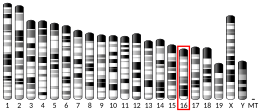From Wikipedia, the free encyclopedia
Protein-coding gene in the species Homo sapiens
Limkain-b1 is a protein that in humans is encoded by the KIAA0430 gene .[ 5] [ 6] [ 7] [ 8]
^ a b c ENSG00000277140 GRCh38: Ensembl release 89: ENSG00000166783, ENSG00000277140 – Ensembl , May 2017^ a b c GRCm38: Ensembl release 89: ENSMUSG00000060657 – Ensembl , May 2017^ "Human PubMed Reference:" . National Center for Biotechnology Information, U.S. National Library of Medicine .^ "Mouse PubMed Reference:" . National Center for Biotechnology Information, U.S. National Library of Medicine .^ Ishikawa K, Nagase T, Nakajima D, Seki N, Ohira M, Miyajima N, Tanaka A, Kotani H, Nomura N, Ohara O (Feb 1998). "Prediction of the coding sequences of unidentified human genes. VIII. 78 new cDNA clones from brain which code for large proteins in vitro" . DNA Res . 4 (5): 307– 313. doi :10.1093/dnares/4.5.307 PMID 9455477 . ^ Loftus BJ, Kim UJ, Sneddon VP, Kalush F, Brandon R, Fuhrmann J, Mason T, Crosby ML, Barnstead M, Cronin L, Deslattes Mays A, Cao Y, Xu RX, Kang HL, Mitchell S, Eichler EE, Harris PC, Venter JC, Adams MD (Nov 1999). "Genome duplications and other features in 12 Mb of DNA sequence from human chromosome 16p and 16q". Genomics . 60 (3): 295– 308. doi :10.1006/geno.1999.5927 . PMID 10493829 . ^ Dunster K, Lai FP, Sentry JW (Jun 2005). "Limkain b1, a novel human autoantigen localized to a subset of ABCD3 and PXF marked peroxisomes" . Clin Exp Immunol . 140 (3): 556– 563. doi :10.1111/j.1365-2249.2005.02774.x . PMC 1809386 PMID 15932519 . ^ "Entrez Gene: KIAA0430 KIAA0430" .
Bonaldo MF, Lennon G, Soares MB (1997). "Normalization and subtraction: two approaches to facilitate gene discovery" . Genome Res . 6 (9): 791– 806. doi :10.1101/gr.6.9.791 PMID 8889548 . Strausberg RL, Feingold EA, Grouse LH, et al. (2003). "Generation and initial analysis of more than 15,000 full-length human and mouse cDNA sequences" . Proc. Natl. Acad. Sci. U.S.A . 99 (26): 16899– 16903. Bibcode :2002PNAS...9916899M . doi :10.1073/pnas.242603899 PMC 139241 PMID 12477932 . Ota T, Suzuki Y, Nishikawa T, et al. (2004). "Complete sequencing and characterization of 21,243 full-length human cDNAs" . Nat. Genet . 36 (1): 40– 45. doi :10.1038/ng1285 PMID 14702039 . Brandenberger R, Wei H, Zhang S, et al. (2005). "Transcriptome characterization elucidates signaling networks that control human ES cell growth and differentiation". Nat. Biotechnol . 22 (6): 707– 716. doi :10.1038/nbt971 . PMID 15146197 . S2CID 27764390 . Gerhard DS, Wagner L, Feingold EA, et al. (2004). "The status, quality, and expansion of the NIH full-length cDNA project: the Mammalian Gene Collection (MGC)" . Genome Res . 14 (10B): 2121– 2127. doi :10.1101/gr.2596504 . PMC 528928 PMID 15489334 . Martin J, Han C, Gordon LA, et al. (2005). "The sequence and analysis of duplication-rich human chromosome 16" . Nature . 432 (7020): 988– 994. Bibcode :2004Natur.432..988M . doi :10.1038/nature03187 PMID 15616553 . Olsen JV, Blagoev B, Gnad F, et al. (2006). "Global, in vivo, and site-specific phosphorylation dynamics in signaling networks" . Cell . 127 (3): 635– 648. doi :10.1016/j.cell.2006.09.026 PMID 17081983 . S2CID 7827573 .
PDBe-KB provides an overview of all the structure information available in the PDB for Human Meiosis regulator and mRNA stability factor 1 (KIAA0430)








